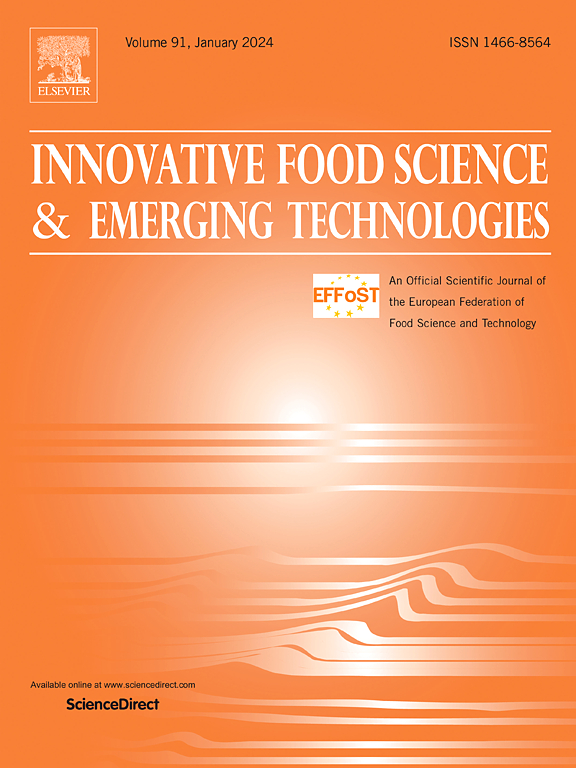脱水紫菜蒸煮消毒的研究
IF 6.8
1区 农林科学
Q1 FOOD SCIENCE & TECHNOLOGY
Innovative Food Science & Emerging Technologies
Pub Date : 2025-08-01
DOI:10.1016/j.ifset.2025.104133
引用次数: 0
摘要
在工业生产中,烤海带小吃(BSS)是由脱水紫菜(Porphyra yezoensis)烘烤而成。本研究表明,生脱水叶藻中需氧菌总数(TAB)在2.36 ~ 7.15 log CFU/g之间。值得注意的是,这些微生物种群在传统的处理方案中存活下来,包括高温烘烤(180-220°C 11-38秒)或两阶段热处理,包括在110-160°C消毒5-15分钟,然后在200°C最终烘烤。为了解决这一问题,在蒸汽烘箱中对生脱水紫杉树进行了蒸汽烘烤预处理。结果表明,在120-150°C下处理STB可以有效灭活细菌,而不会影响最终BSS的质量。采用Weibull模型拟合STB期间微生物存活曲线。值得注意的是,150°C STB处理5分钟可直接将脱水的叶斑杉转化为BSS,无需在200°C下进行额外的高温烘烤。本研究证实STB是一种很有前途的技术,可以对脱水叶斑草原料进行消毒,并在保持产品完整性的同时大幅提高BSS的微生物质量。本文章由计算机程序翻译,如有差异,请以英文原文为准。
Steam-baking for disinfection of dehydrated Porphyra yezoensis
In industrial production, the baked seaweed snack (BSS) is prepared by baking dehydrated Porphyra yezoensis. This study revealed that total aerobic bacteria (TAB) counts in raw dehydrated P. yezoensis ranged from 2.36 to 7.15 log CFU/g. Remarkably, these microbial populations were found to survive conventional processing protocols, including high-temperature baking (180–220 °C for 11–38 s) or two-stage thermal treatments involving disinfection at 110–160 °C for 5–15 min followed by final baking at 200 °C. To address this challenge, steam-baking (STB) pretreatment was applied to raw dehydrated P. yezoensis using a steam oven. The results demonstrated that STB treatment at 120–150 °C effectively inactivated bacteria without compromising the quality of the final BSS. Microbial survival curves during STB were well-fitted by the Weibull model. Notably, 150 °C STB treatment for 5 min directly converted dehydrated P. yezoensis into BSS, eliminating the need for additional high-temperature baking at 200 °C. This study establishes STB as a promising technology for disinfecting dehydrated P. yezoensis raw materials and substantially enhancing the microbiological quality of BSS while maintaining product integrity.
求助全文
通过发布文献求助,成功后即可免费获取论文全文。
去求助
来源期刊
CiteScore
12.00
自引率
6.10%
发文量
259
审稿时长
25 days
期刊介绍:
Innovative Food Science and Emerging Technologies (IFSET) aims to provide the highest quality original contributions and few, mainly upon invitation, reviews on and highly innovative developments in food science and emerging food process technologies. The significance of the results either for the science community or for industrial R&D groups must be specified. Papers submitted must be of highest scientific quality and only those advancing current scientific knowledge and understanding or with technical relevance will be considered.

 求助内容:
求助内容: 应助结果提醒方式:
应助结果提醒方式:


